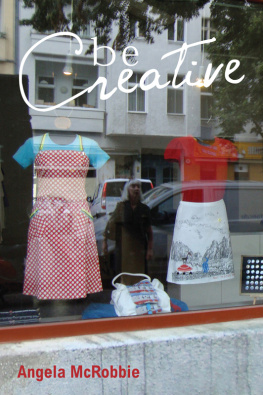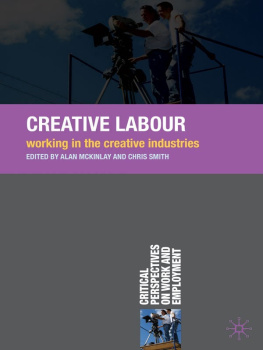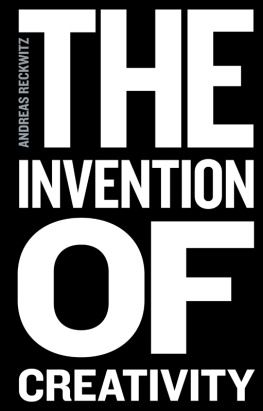
Copyright page
Copyright Angela McRobbie 2016
The right of Angela McRobbie to be identified as Author of this Work has been asserted in accordance with the UK Copyright, Designs and Patents Act 1988.
First published in 2016 by Polity Press
Polity Press
65 Bridge Street
Cambridge CB2 1UR, UK
Polity Press
350 Main Street
Malden, MA 02148, USA
All rights reserved. Except for the quotation of short passages for the purpose of criticism and review, no part of this publication may be reproduced, stored in a retrieval system, or transmitted, in any form or by any means, electronic, mechanical, photocopying, recording or otherwise, without the prior permission of the publisher.
ISBN-13: 978-0-7456-6194-0 (hardback)
ISBN-13: 978-0-7456-6195-7 (paperback)
A catalogue record for this book is available from the British Library.
Library of Congress Cataloging-in-Publication Data
McRobbie, Angela.
Be creative: making a living in the new culture industries / Angela McRobbie.
pages cm
ISBN 978-0-7456-6194-0 (hardback) ISBN 978-0-7456-6195-7 (paperback) 1. Cultural industries. 2. Cultural industriesEmployees. 3. ArtsEconomic aspects. I. Title.
HD9999.C9472M37 2015
650.1dc23
2015010073
Typeset in 10.5 on 12 pt Sabon
by Toppan Best-set Premedia Limited
Printed and bound in Great Britain by Clays Ltd, St Ives PLC
The publisher has used its best endeavours to ensure that the URLs for external websites referred to in this book are correct and active at the time of going to press. However, the publisher has no responsibility for the websites and can make no guarantee that a site will remain live or that the content is or will remain appropriate.
Every effort has been made to trace all copyright holders, but if any have been inadvertently overlooked the publisher will be pleased to include any necessary credits in any subsequent reprint or edition.
For further information on Polity, visit our website:
politybooks.com
Acknowledgements
My first thanks must go to the Berlin-based artist and academic Marion von Osten. In the early 2000s Marion arranged for some of my earlier work on UK fashion designers to be translated and published in German. Round about the same time she had a show in Zurich which she called Be Creative, and I have borrowed the phrase from her for the title of this book. In 2002 Marion invited me to join a project funded by the German Cultural Ministry Atelier Europa and this collaboration also crystallized many of the ideas I subsequently followed up in this book. was first presented tentatively at the Bauhaus Dessau, followed by the Munich Kunstverein. Indeed this whole book maps a series of exchanges and collaborations between London and Berlin and so I would also like to thank the following people in Berlin: Kerstin Drechsel, Rita Eichelkraut, Maria Exner, Marte Henschel, Ares Kalandides, Bastian Lange, Oliver MacConnell, Bettina Springer, Tatjana Turanskyj, Agnes Zelei and, in both Berlin and Spoleto, Monika Savier. In addition I am grateful to Nana Adusei-Poku, Sabine Hark and Ulrike Ottinger for such great friendship and support in Berlin.
So much of what I write about here has been formulated in the course of my working days, weeks and years at Goldsmiths, University of London. Always on a small budget, we have nevertheless managed to host events, seminars and talks, which have brought academics from across the world and this has helped us all in turn to develop our own research programmes. These invitees have included the late Ulrich Beck, Judith Butler, Angela Davis, Michel Feher, Maurizio Lazzarato and Bernard Stiegler. Many of my former students have become busy creative professionals, while others are by now established academics; thanks then to Bridget Conor, Kerstin Forkert, Onur Komurcu, Guido del Ponzo and Sharmadean Reid. My Goldsmiths colleagues have also been inspiring and I offer warm thanks to them, especially Sara Ahmed, Lisa Blackman, Matt Fuller, Sarah Kember, Scott Lash, Gerald Lidstone, Carrie Paechter, Sian Prime and Joanna Zylinska. Thanks also to Goldsmiths for providing funding, which has enabled much of this current work to be undertaken in London and Berlin, as well as in Italy. These funds have been supplemented in recent years by an Arts and Humanities Research Council grant titled CREATe, based in Glasgow University School of Law. I wish to express my deep gratitude for this support and for the collegiality of participants.
This book has taken longer to complete than expected and for this reason I want to thank several journals and publishers for granting permission for the following chapters. were published in 2012 in a Festschrift volume for Ulrich Beck; I would like to express my thanks to Transcript Verlag in Hamburg for using them again here.
Various international colleagues have invited me to present chapters from this book and I would especially like to thank Norma Rantisi and Matt Soar at Concordia University, Montreal, where I spent several days in 2013; likewise Chelsey Hauge, Mary K. Bryson and Janice Stewart at the University of British Columbia, Institute for Gender, Race, Sexuality and Social Justice in Vancouver. In 2012 I spent a week in residence at McMaster University, Hamilton, as Hooker Visiting Professor, and I am also grateful to Priya Kapoor for inviting me to speak at Portland State University during my times in Oregon between 2011 and 2013. I was honoured to present an early draft of at the Festschrift for Ulrich Beck at the Ludwig Maximilians University in Munich in 2011. Like so many others, I feel the recent loss of both Ulrich Beck and Stuart Hall deeply and the influence of both these thinkers flows across the pages of this book.
Finally, I want to thank my personal friends and family. Paul Gilroy and Vron Ware have been my neighbours in North London for so long; likewise, Shelley Charlesworth, Denise Riley and Irit Rogoff. In Birmingham I would like to thank Mo White, who also provided the cover photograph. Now in San Francisco, I would like to thank Sarah Thornton and her family, and my sister Ros Lambert in Edinburgh. As ever, I thank my daughter Hanna and I dedicate this book to two small boys Joseph McGhee and Gabriel McGhee.
Introduction: Pedagogical Encounters and Creative Economy
For more than a decade now I am generally, on Wednesday afternoons through the Spring term, sitting in my office from midday onwards, seeing the Master's students to discuss their research dissertations. What I have seen unfolding in front of my eyes during these supervisions is a microcosm of the new creative labour market, taking into account also the impact of the Euro-crisis and the global financial recession since 2008. The lives and times of these young people reflect many of the themes in this book. In my university department and across the institution we offer a whole assortment of one-year Master's courses. These include Media and Communications, Brand Development, Transnational Media, Culture Industries, Cultural and Creative Entrepreneurship, Gender, Media and Culture and so on. Students have to pay fees and there are only a handful of bursaries, but this does not mean our constituency is from the international wealthy classes; but rather they are the children of the middle classes from various countries across the world. The parents are, as far as I can surmise, teachers, civil servants, small publishers, doctors, sometimes themselves from the arts and creative worlds. The students come from Brazil and from Portugal, from Bulgaria and Lithuania, from Russia, Germany, Italy and Spain, from Greece and Turkey, from Croatia, Montenegro and Slovenia, from Poland and from the Middle East. They also come from China, Korea and from southeast Asia. To enter the courses they must reach a high level of competence in English to ensure they are able to write four 6,000-word essays and a 12,000-word dissertation in line with the Bologna regulations for Master's courses across EU countries. We also have a sprinkling of UK students and some from other countries, including those above, but who have been resident in the UK for many years and have already completed a BA in a UK university.
Next page





